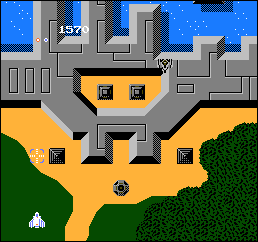 The Game: As the commander of a sleek Solvalou fighter, you’re deep into enemy territory, shooting their disc-shaped fighters out of the sky, bombing ground installations and artillery nests, bombing tanks, and trying to destroy the mothership. As you progress further behind enemy lines, heavier aircraft and more versatile and Buy this gamedeadly ground-based defenses become the norm. Also look out for tumbling airborne mirrors – they’re impervious to your fire, but you’re toast if you fly right into them. (Nintendo [under license from Namco], 1986)
The Game: As the commander of a sleek Solvalou fighter, you’re deep into enemy territory, shooting their disc-shaped fighters out of the sky, bombing ground installations and artillery nests, bombing tanks, and trying to destroy the mothership. As you progress further behind enemy lines, heavier aircraft and more versatile and Buy this gamedeadly ground-based defenses become the norm. Also look out for tumbling airborne mirrors – they’re impervious to your fire, but you’re toast if you fly right into them. (Nintendo [under license from Namco], 1986)
Memories: Adapted for the Nintendo Vs. arcade cartridge system, which used the same technology as the NES console, Super Xevious underwent a transformation, trading in its extremely vertical view for an extremely crunched horizontal/almost-square screen, typical of games which were ported to the Vs. system.
 Unfortunately, in the process of this port, Super Xevious lost more than it gained. The intricate graphical style that been part of Xevious since its original 1982 release was diluted, and a grand opportunity was lost to make the Vs. edition of Super Xevious a cooperative (or competitive) two-player game, something that would’ve made this extra iteration of the game worthwhile. As it is, the Vs. edition of Super Xevious isn’t so much something extra as something completely extraneous, adding nothing to the game and subtracting its trademark audiovisual elements.
Unfortunately, in the process of this port, Super Xevious lost more than it gained. The intricate graphical style that been part of Xevious since its original 1982 release was diluted, and a grand opportunity was lost to make the Vs. edition of Super Xevious a cooperative (or competitive) two-player game, something that would’ve made this extra iteration of the game worthwhile. As it is, the Vs. edition of Super Xevious isn’t so much something extra as something completely extraneous, adding nothing to the game and subtracting its trademark audiovisual elements.
There’s a general consensus that the late 1980s saw the line blurred  between arcade graphics and home console graphics thanks to the NES and its competitors, but this Super Xevious port shows the flipside of that belief: console graphics
between arcade graphics and home console graphics thanks to the NES and its competitors, but this Super Xevious port shows the flipside of that belief: console graphics  were getting better by leaps and bounds, sure, but by building arcade machines on their console technology, Nintendo was helping to lower the bar that its consoles would have to reach for arcade accuracy.
were getting better by leaps and bounds, sure, but by building arcade machines on their console technology, Nintendo was helping to lower the bar that its consoles would have to reach for arcade accuracy.
